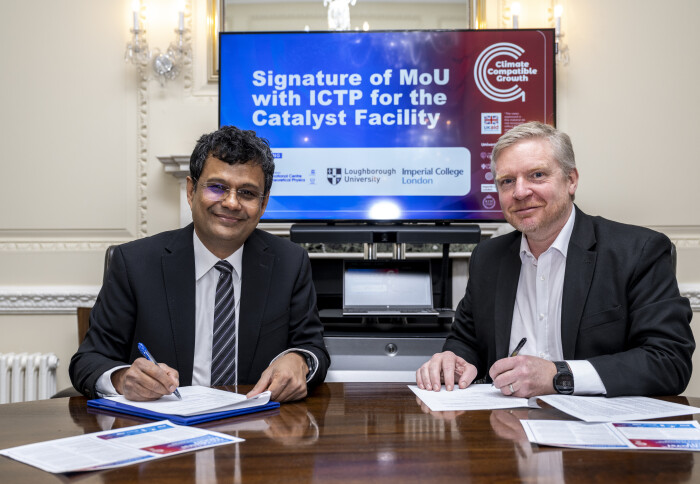Imperial signs agreement to foster climate change research in the Global South
by Jacklin Kwan

Professor Atish Dabholkar (left) and Professor Mark Howells (right) at the MoU Catalyst Facility signing ceremony.
Imperial formalised a partnership between two global centres for climate change research, aimed at cultivating expertise in the Global South.
The Climate Compatible Growth (CCG) and the Abdus Salam International Centre for Theoretical Physics (ICTP) based in Trieste have agreed upon a Memorandum of Understanding, establishing a collaborative effort through the newly initiated Catalyst Facility, which will be managed by the ICTP.
During a signing ceremony held on January 30, the pact was endorsed by Professor Mark Howells of Imperial College London and Loughborough University, representing CCG as Programme Director, and Dr Atish Dabholkar, Director of ICTP.
The Catalyst Facility is intended to solidify regional proficiency in energy modelling, analysis, and broader climate change issues, ensuring sustainable expertise.
Professor Mark Howells, Programme Director of the CCG: “The CCG includes leading UK universities and global research networks that are excited to plug into organisations, like the ICTP, with the goal of improving science knowledge exchange and helping bring scientific evidence to bear on policymaking.”
Professor Atish Dabholkar, Director of the ICTP: “The ICTP’s fundamental mission is to create high-level science globally so that all countries can engage themselves in decision-making. Just a small investment in capacity building can improve the evidence base for climate action as well as the agency of people that help develop that evidence base.”
Empowering local universities in a climate-driven era
 Professor Howells underscored the strategic importance of integrating these expertise-building initiatives within local universities, thereby safeguarding them from political fluctuations and cultivating in-country talent.
Professor Howells underscored the strategic importance of integrating these expertise-building initiatives within local universities, thereby safeguarding them from political fluctuations and cultivating in-country talent.
Local researchers, with their regional insights, can help plan national climate transitions across industry and public sector bodies.
An additional benefit of the partnership is the provision of funding for academics, fostering international academic collaboration.
The ICTP has had an excellent track-record in delivering educational programmes since its establishment in the 1960s, and will help lead to delivery of the CCG’s expertise-building initiatives.
The ICTP's efforts, particularly in East Africa, have been directed towards investing in students through Master’s programs and other training initiatives, demonstrating the substantial impact of even limited investments.
In the future, we'll be able to invest in the next generation of decision-makers by partnering directly with universities in the Global South... Dr Vivien Foster Centre for Environmental Policy
Dr Vivien Foster, Principal Research Fellow in the Centre for Environmental Policy (CEP), said: “This memorandum enables Imperial, through the Climate Compatible Growth initiative, to take its partnership with ICTP to the next level. To date, we've been focusing mainly on mid-career professional development for both academics and policymakers in the Global South.”
“In the future, we'll be able to invest in the next generation of decision-makers by partnering directly with universities in the Global South to develop MSc programmes in energy modelling for sustainable development,” she said.
The CEP is a key research contributor to the CCG. Professor Jem Woods, the Director of the CEP, said: “Imperial facilitates interdisciplinary research that is informed by bottom-up and blue skies thinking, which can be applied as part of integrated solutions to global challenges.”
“Imperial’s environmental research communities, including the Centre for Environmental Policy, will be able to collaborate to contribute its extraordinary expertise,” he said.
The Catalyst Fund is slated to open for applications from April 2024, and CCG is actively seeking further philanthropic contributions to expand the Catalyst Facility's reach.
Article text (excluding photos or graphics) © Imperial College London.
Photos and graphics subject to third party copyright used with permission or © Imperial College London.
Reporter
Jacklin Kwan
Faculty of Natural Sciences